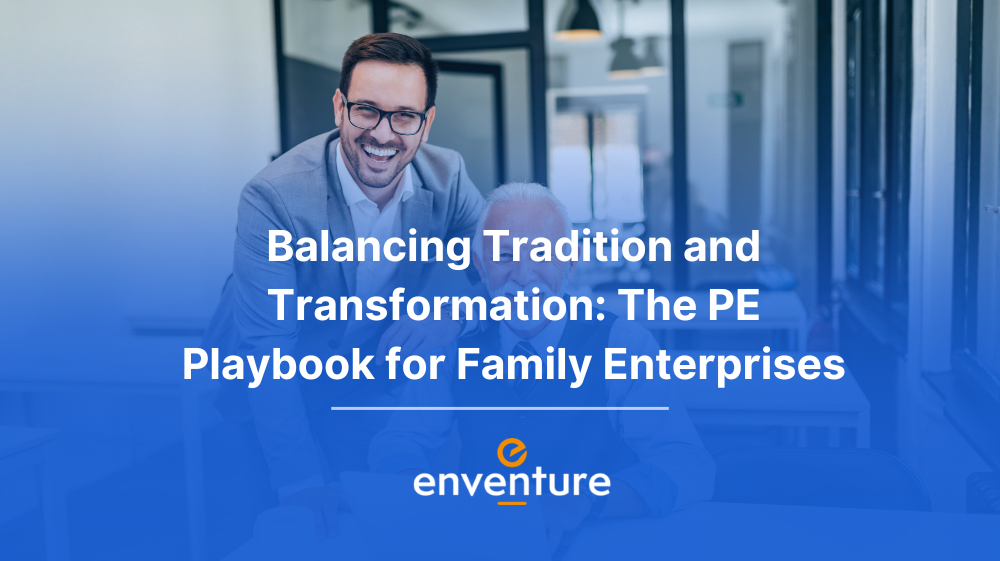Discover how private equity firms help family-owned businesses grow by modernizing operations and scaling sustainable.without losing their legacy or values

In today’s rapidly evolving business landscape, family-owned companies stand at a unique crossroads. They carry the weight of legacy, deep-rooted values, and generational pride—yet face increasing pressure to innovate, scale, and compete. Private equity (PE) firms, often seen as agents of change, are playing a vital role in helping these businesses strike a delicate balance: preserving their heritage while driving strategic transformation.
This blog explores how PE investors successfully partner with family-owned enterprises, respecting their traditions while steering them toward sustainable growth. From modernizing operations to introducing professional leadership, we’ll walk through the PE playbook that aligns legacy with innovation.
Why Family Businesses Need Strategic Transformation
Family businesses are known for their resilience, long-term orientation, and strong customer relationships. However, many face challenges such as:
-
Succession planning uncertainty
-
Outdated technology and systems
-
Limited access to capital for expansion
-
Informal decision-making processes
Without intervention, these factors can hinder competitiveness. This is where private equity for legacy businesses becomes a powerful catalyst—not to overhaul the essence of the company, but to unlock potential with respect for its past.
The PE Playbook: How Investors Navigate Legacy and Change
1. Cultural Due Diligence Comes First
Before any investment is made, top PE firms conduct more than financial audits—they engage in cultural due diligence. Understanding the family’s values, history, and vision helps investors build trust and ensures smoother integration.
✅ Real-World Example: A mid-sized food processing family business in the Midwest was hesitant about outside investors. The PE firm won them over by attending family-run events, learning their product story, and co-developing a roadmap that preserved the founders’ legacy recipes while automating backend operations.
2. Professionalizing Without Politicizing
One of the most transformative steps PE firms take is introducing professional management. For businesses used to informal, family-led decision-making, this shift can be sensitive. Successful firms:
-
Separate ownership from day-to-day management
-
Bring in seasoned executives with experience in family dynamics
-
Establish clear KPIs and accountability systems
3. Modernizing Operations While Honoring Craft
Whether it’s adopting ERP systems or refining supply chains, modernizing traditional businesses doesn’t mean abandoning artisanal quality or personal service. PE firms typically invest in digital tools and operational efficiency—but always with an eye toward preserving what makes the brand special.
✅ Case in Point: A family-run textile company in Southeast Asia modernized its manufacturing process under PE guidance, cutting waste by 40%. However, the original fabric patterns—passed down from three generations—remained untouched, preserving brand identity.
4. Growth Through Scalable Structures
Private equity thrives on scaling family-owned companies. This means optimizing the business for multi-location expansion, e-commerce, or global distribution. However, growth is paced to protect the brand's reputation and community ties.
-
Franchise models for regional brands
-
Licensing strategies for niche products
-
Digital transformation to access broader markets
Best Practices for Harmonizing Legacy and Innovation
Here are actionable insights for family enterprises and PE investors alike:
-
Co-create a transformation roadmap: Align on goals, values, and vision from day one.
-
Respect the founder’s story: Use it as a branding asset, not an obstacle.
-
Be transparent with stakeholders: Employees, suppliers, and customers value authenticity.
-
Retain symbolic roles for founders: Their continued presence builds confidence, even if operational control shifts.
-
Invest in training and change management: Culture shifts need support to take root.
The Future is Both Familiar and Forward-Thinking
When done right, private equity can serve as a bridge between heritage and growth. Family enterprises no longer have to choose between maintaining tradition or embracing transformation. With the right partners, they can have both.
As more private equity firms refine their approach to working with legacy businesses, we’re seeing a new era emerge—one where innovation respects identity, and where the past is not erased, but evolved.
Bold Moves,
Brighter Futures
Let's team up and make a difference.
Subscribe to our newsletter
Enventure is an exit-driven fund with high-yield opportunities in the healthcare, space, and green tech sectors across the US and India.
Mail Us
3103 Kewanee Ln,
Naperville, IL, 60564
Copyright © 2025 Enventure, all rights reserved.
